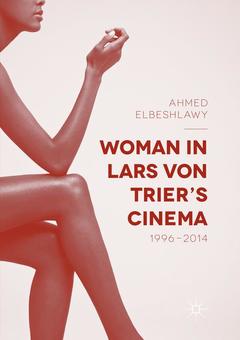Description
Woman in Lars von Trier’s Cinema, 1996–2014, Softcover reprint of the original 1st ed. 2016
Language: English
Publication date: 06-2018
Support: Print on demand
Support: Print on demand
Description
/li>Contents
/li>Biography
/li>Comment
/li>
This book discusses the figure of Woman in Lars von Trier?s distinctive cinematic productions from 1996 to 2014. It takes the notorious legacy of violence against women in von Trier?s cinema beyond the perceived gender division, elevating the director?s image above being a mere provocateur. By raising fundamental questions about woman, sexuality, and desire, Elbeshlawy shows that Trier?s cinematic Woman is an attempt at creating an image of a genderless subject that is not inhibited by the confines of ideology and culture. But this attempt is perennially ill-fated. And it is this failure that not only fosters viewing enjoyment but also gives the films their political importance, elevating them above both commendations and condemnations of feminist discourse.
1. Introduction: The Lacanian Woman and Lars von Trier’s Cinema.- 2. The Danger of the Naive Religious Woman of Breaking the Waves.- 3. Idioterne: Woman as a Proponent of Real Politics.- 4. Dancer in the Dark: Deploying the Siren, Impairing the Sight.- 5. Dogville: Woman as an Ideological Cinematic Tool.- 6. Manderlay: The Gift, Grace’s Desire, and the Collapse of Ideology.- 7. The Deployment of the Impossible Woman in Antichrist.- 8. Besides Melancholia and Beyond Gender: Melancholia.- 9. Conclusion, or, Desire as Law: the Loneliness of Nymphomaniac between Pornography and Narrative.
Ahmed Elbeshlawy is an independent scholar and occasional lecturer. He is author of America in Literature and Film (2011) and has contributed articles to The Comparatist (2008), the forthcoming Palgrave Handbook to Literature and the City, female/bodies (2005, 2006), Scope (2008) and Sexuality and Culture (2014).
Discusses corpus of Trier's cinematic production from 1996-2014 Employs Lacanian psychoanalysis and a number of its contemporary exponents such as Slavoj Žižek, Todd McGowan and Anna Kornbluh Questions what is exactly is enjoyed in viewing Lars von Trier’s productions
© 2024 LAVOISIER S.A.S.
These books may interest you

Feeling FilmA Spatial Approach 126.59 €

Feeling FilmA Spatial Approach 26.36 €


